BTEC HNC: Starbucks Management & Operations - Leader and Manager Roles
VerifiedAdded on 2023/06/18
|10
|899
|379
Report
AI Summary
This report provides an overview of management and operations at Starbucks Corporation, focusing on the distinct roles and features of leaders and managers within the organization. It evaluates the differences between these roles by implementing various theories and concepts, highlighting how both contribute to the company's effectiveness and productivity. The analysis emphasizes the importance of skilled leaders and managers in achieving positive outcomes and improving overall efficiency. The report concludes that the company benefits significantly from the contributions of talented and skilled leaders and managers.
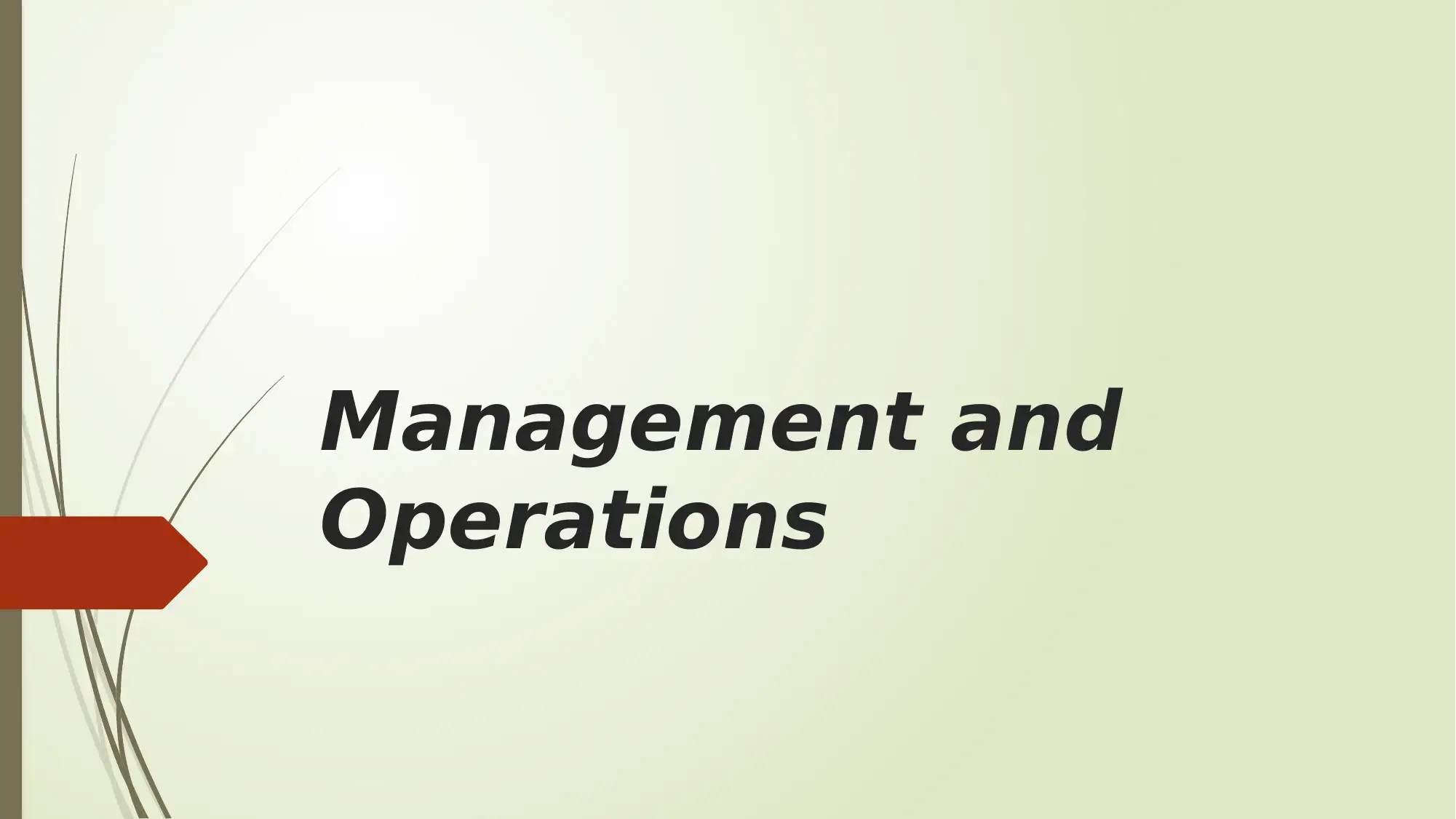
Management and
Operations
Operations
Paraphrase This Document
Need a fresh take? Get an instant paraphrase of this document with our AI Paraphraser
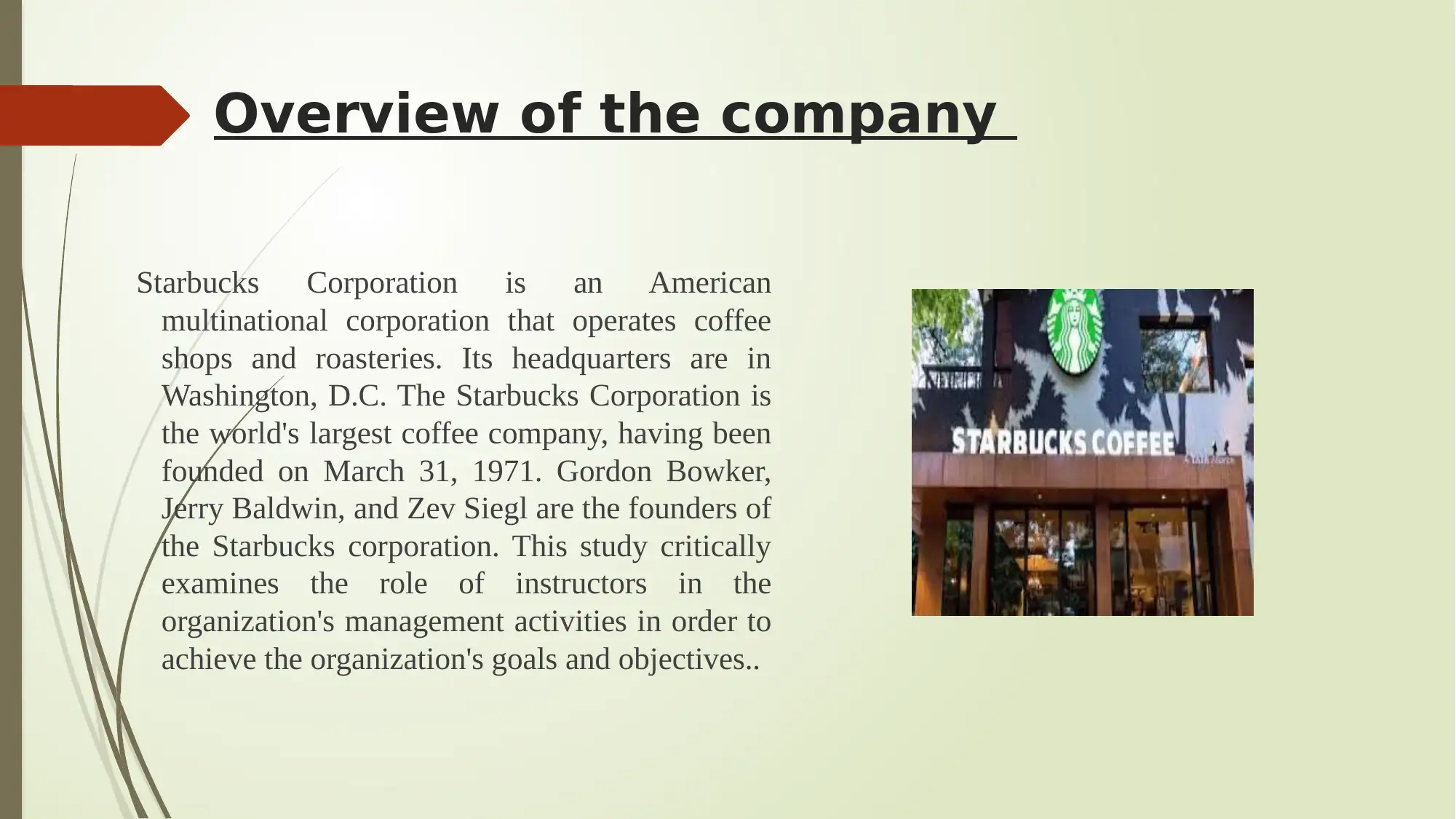
Overview of the company
Starbucks Corporation is an American
multinational corporation that operates coffee
shops and roasteries. Its headquarters are in
Washington, D.C. The Starbucks Corporation is
the world's largest coffee company, having been
founded on March 31, 1971. Gordon Bowker,
Jerry Baldwin, and Zev Siegl are the founders of
the Starbucks corporation. This study critically
examines the role of instructors in the
organization's management activities in order to
achieve the organization's goals and objectives..
Starbucks Corporation is an American
multinational corporation that operates coffee
shops and roasteries. Its headquarters are in
Washington, D.C. The Starbucks Corporation is
the world's largest coffee company, having been
founded on March 31, 1971. Gordon Bowker,
Jerry Baldwin, and Zev Siegl are the founders of
the Starbucks corporation. This study critically
examines the role of instructors in the
organization's management activities in order to
achieve the organization's goals and objectives..
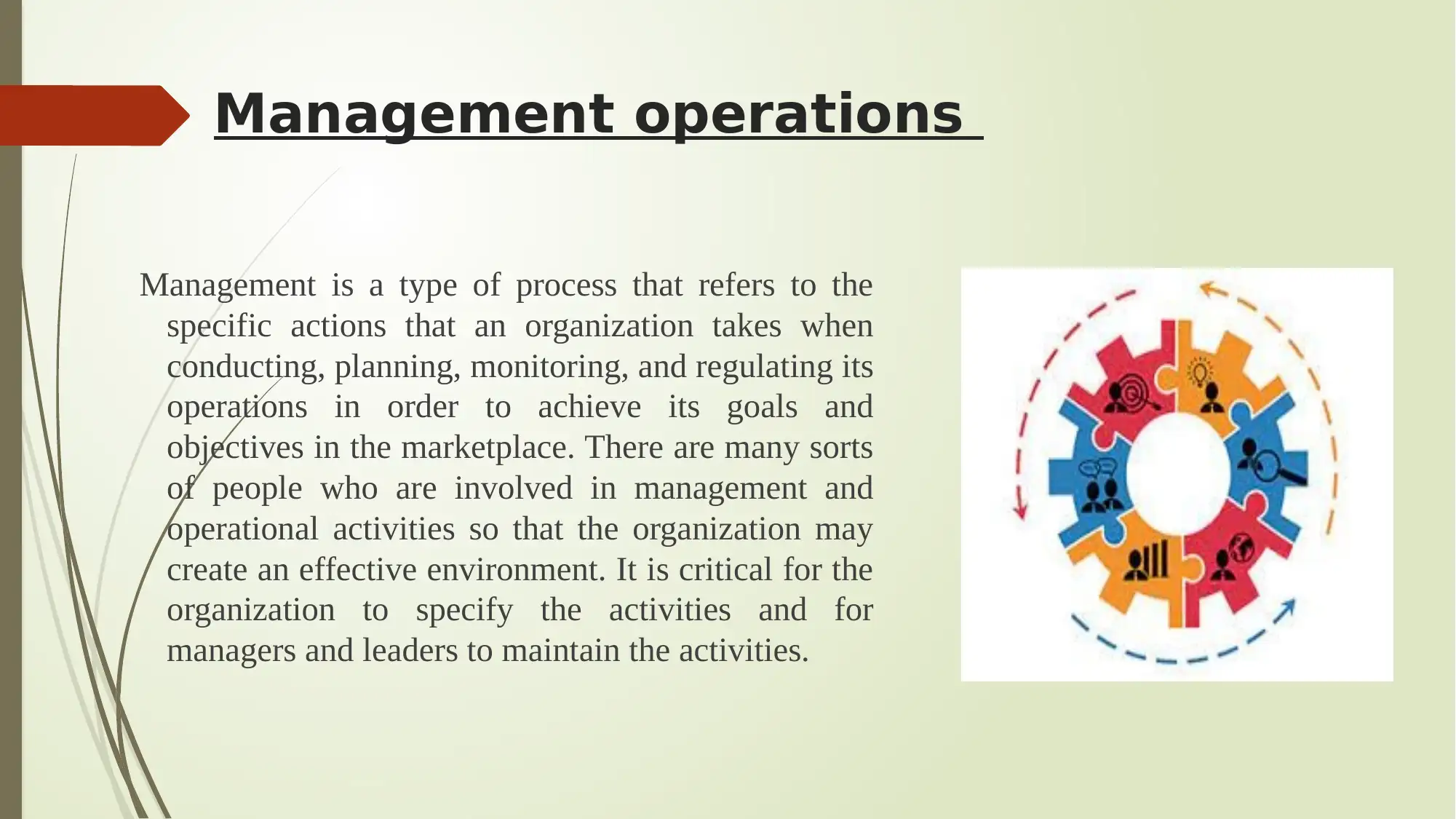
Management operations
Management is a type of process that refers to the
specific actions that an organization takes when
conducting, planning, monitoring, and regulating its
operations in order to achieve its goals and
objectives in the marketplace. There are many sorts
of people who are involved in management and
operational activities so that the organization may
create an effective environment. It is critical for the
organization to specify the activities and for
managers and leaders to maintain the activities.
Management is a type of process that refers to the
specific actions that an organization takes when
conducting, planning, monitoring, and regulating its
operations in order to achieve its goals and
objectives in the marketplace. There are many sorts
of people who are involved in management and
operational activities so that the organization may
create an effective environment. It is critical for the
organization to specify the activities and for
managers and leaders to maintain the activities.
⊘ This is a preview!⊘
Do you want full access?
Subscribe today to unlock all pages.

Trusted by 1+ million students worldwide
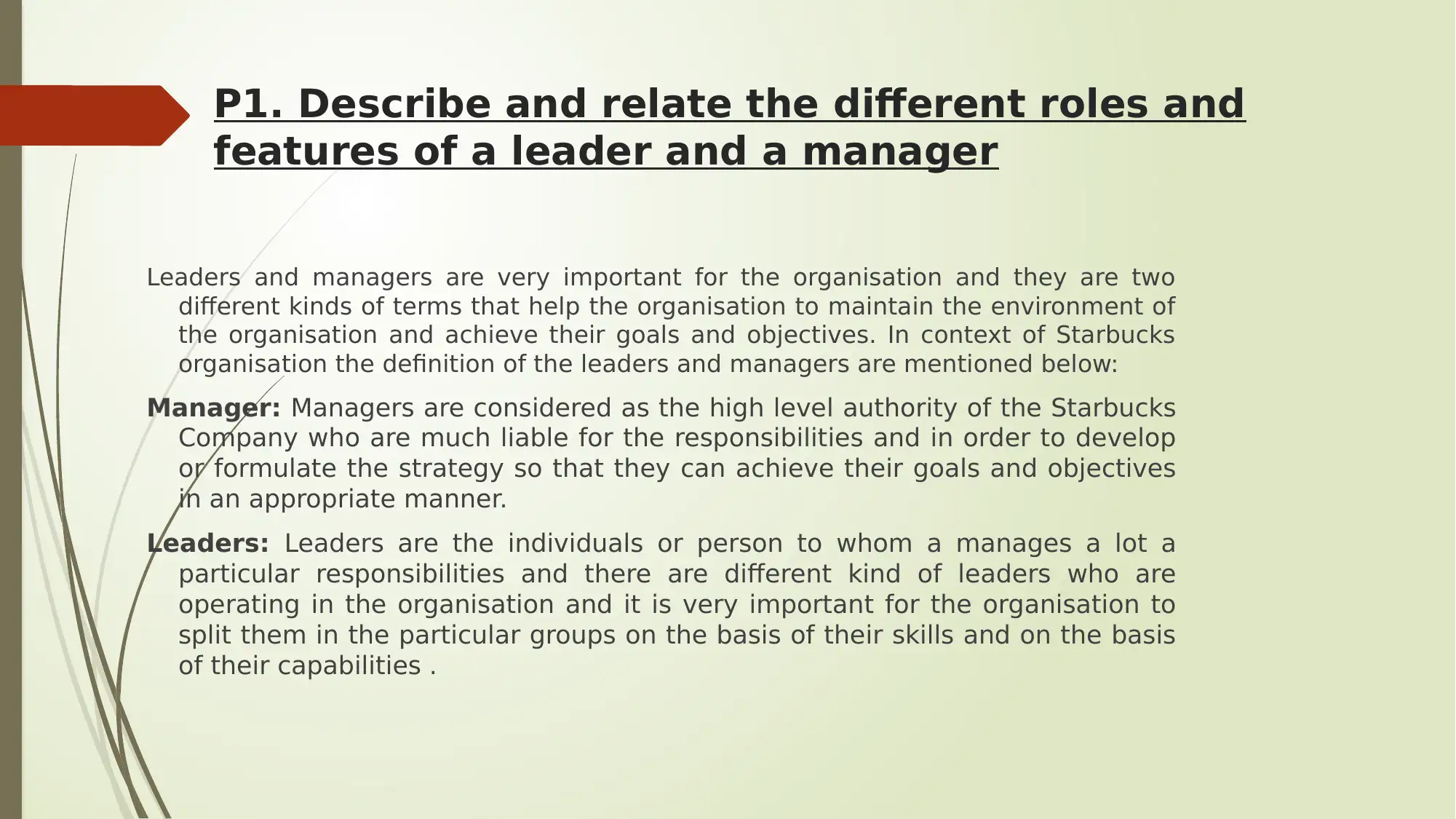
P1. Describe and relate the different roles and
features of a leader and a manager
Leaders and managers are very important for the organisation and they are two
different kinds of terms that help the organisation to maintain the environment of
the organisation and achieve their goals and objectives. In context of Starbucks
organisation the definition of the leaders and managers are mentioned below:
Manager: Managers are considered as the high level authority of the Starbucks
Company who are much liable for the responsibilities and in order to develop
or formulate the strategy so that they can achieve their goals and objectives
in an appropriate manner.
Leaders: Leaders are the individuals or person to whom a manages a lot a
particular responsibilities and there are different kind of leaders who are
operating in the organisation and it is very important for the organisation to
split them in the particular groups on the basis of their skills and on the basis
of their capabilities .
features of a leader and a manager
Leaders and managers are very important for the organisation and they are two
different kinds of terms that help the organisation to maintain the environment of
the organisation and achieve their goals and objectives. In context of Starbucks
organisation the definition of the leaders and managers are mentioned below:
Manager: Managers are considered as the high level authority of the Starbucks
Company who are much liable for the responsibilities and in order to develop
or formulate the strategy so that they can achieve their goals and objectives
in an appropriate manner.
Leaders: Leaders are the individuals or person to whom a manages a lot a
particular responsibilities and there are different kind of leaders who are
operating in the organisation and it is very important for the organisation to
split them in the particular groups on the basis of their skills and on the basis
of their capabilities .
Paraphrase This Document
Need a fresh take? Get an instant paraphrase of this document with our AI Paraphraser
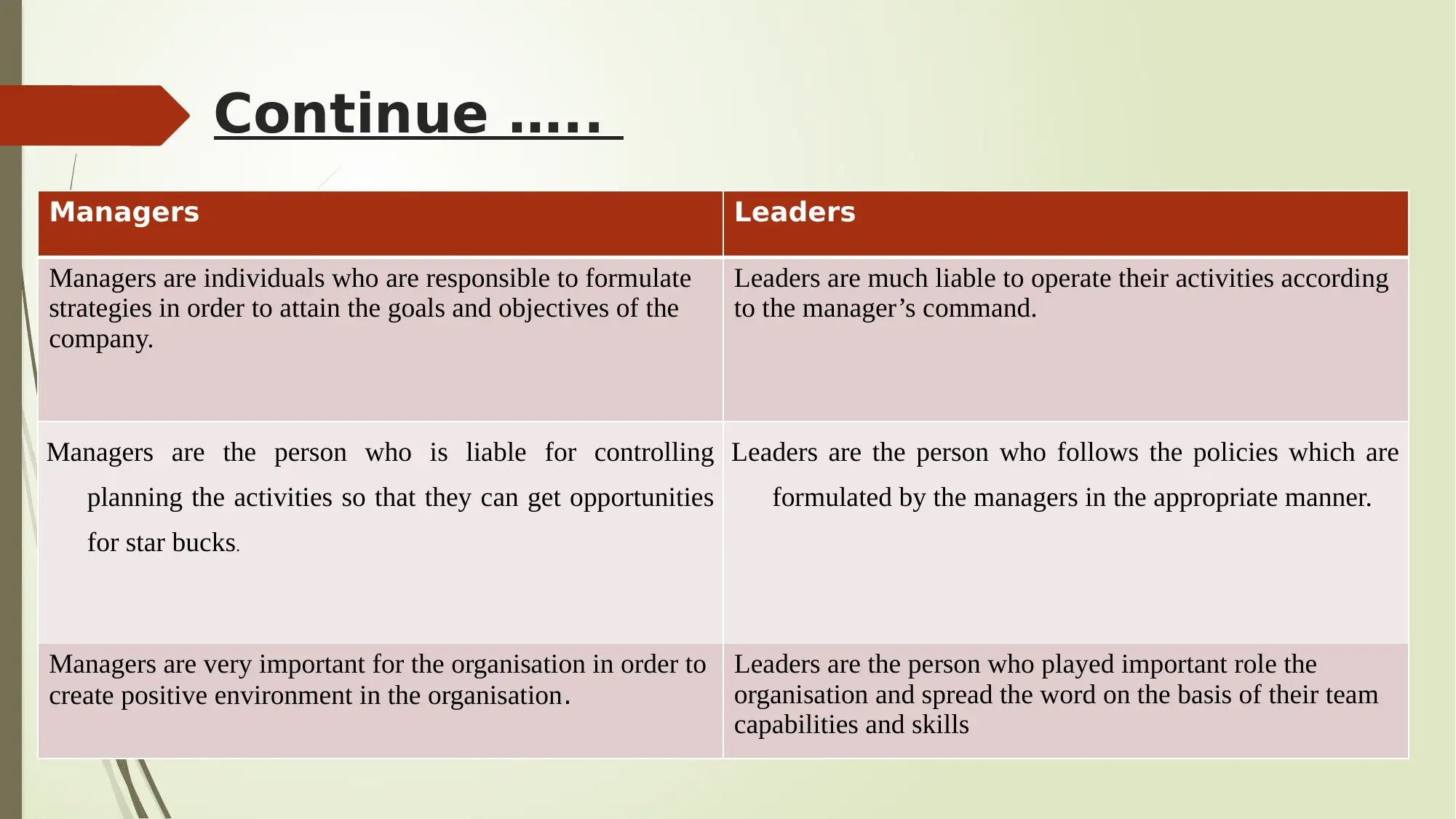
Continue …..
Managers Leaders
Managers are individuals who are responsible to formulate
strategies in order to attain the goals and objectives of the
company.
Leaders are much liable to operate their activities according
to the manager’s command.
Managers are the person who is liable for controlling
planning the activities so that they can get opportunities
for star bucks.
Leaders are the person who follows the policies which are
formulated by the managers in the appropriate manner.
Managers are very important for the organisation in order to
create positive environment in the organisation.
Leaders are the person who played important role the
organisation and spread the word on the basis of their team
capabilities and skills
Managers Leaders
Managers are individuals who are responsible to formulate
strategies in order to attain the goals and objectives of the
company.
Leaders are much liable to operate their activities according
to the manager’s command.
Managers are the person who is liable for controlling
planning the activities so that they can get opportunities
for star bucks.
Leaders are the person who follows the policies which are
formulated by the managers in the appropriate manner.
Managers are very important for the organisation in order to
create positive environment in the organisation.
Leaders are the person who played important role the
organisation and spread the word on the basis of their team
capabilities and skills
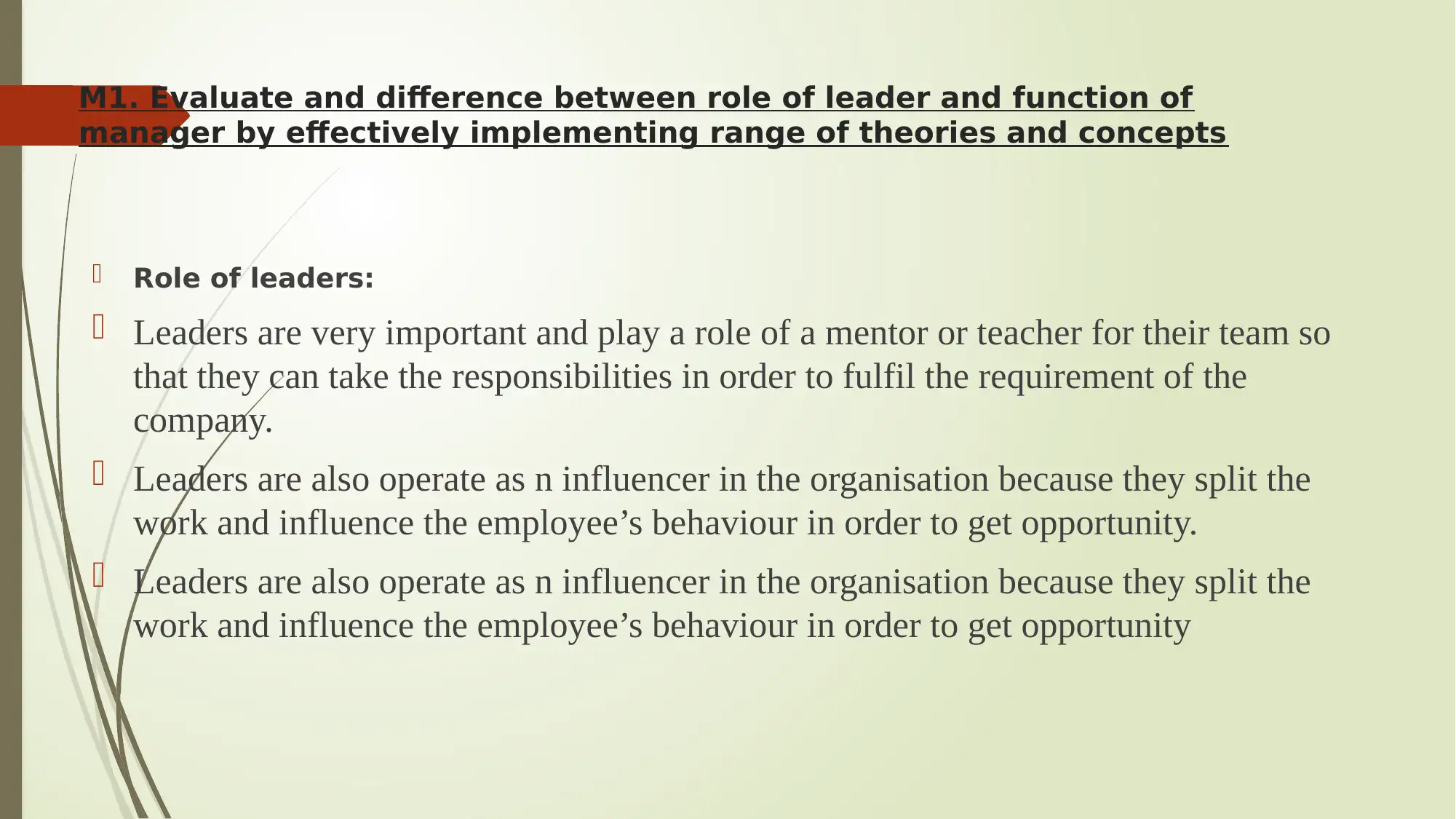
M1. Evaluate and difference between role of leader and function of
manager by effectively implementing range of theories and concepts
Role of leaders:
Leaders are very important and play a role of a mentor or teacher for their team so
that they can take the responsibilities in order to fulfil the requirement of the
company.
Leaders are also operate as n influencer in the organisation because they split the
work and influence the employee’s behaviour in order to get opportunity.
Leaders are also operate as n influencer in the organisation because they split the
work and influence the employee’s behaviour in order to get opportunity
manager by effectively implementing range of theories and concepts
Role of leaders:
Leaders are very important and play a role of a mentor or teacher for their team so
that they can take the responsibilities in order to fulfil the requirement of the
company.
Leaders are also operate as n influencer in the organisation because they split the
work and influence the employee’s behaviour in order to get opportunity.
Leaders are also operate as n influencer in the organisation because they split the
work and influence the employee’s behaviour in order to get opportunity
⊘ This is a preview!⊘
Do you want full access?
Subscribe today to unlock all pages.

Trusted by 1+ million students worldwide
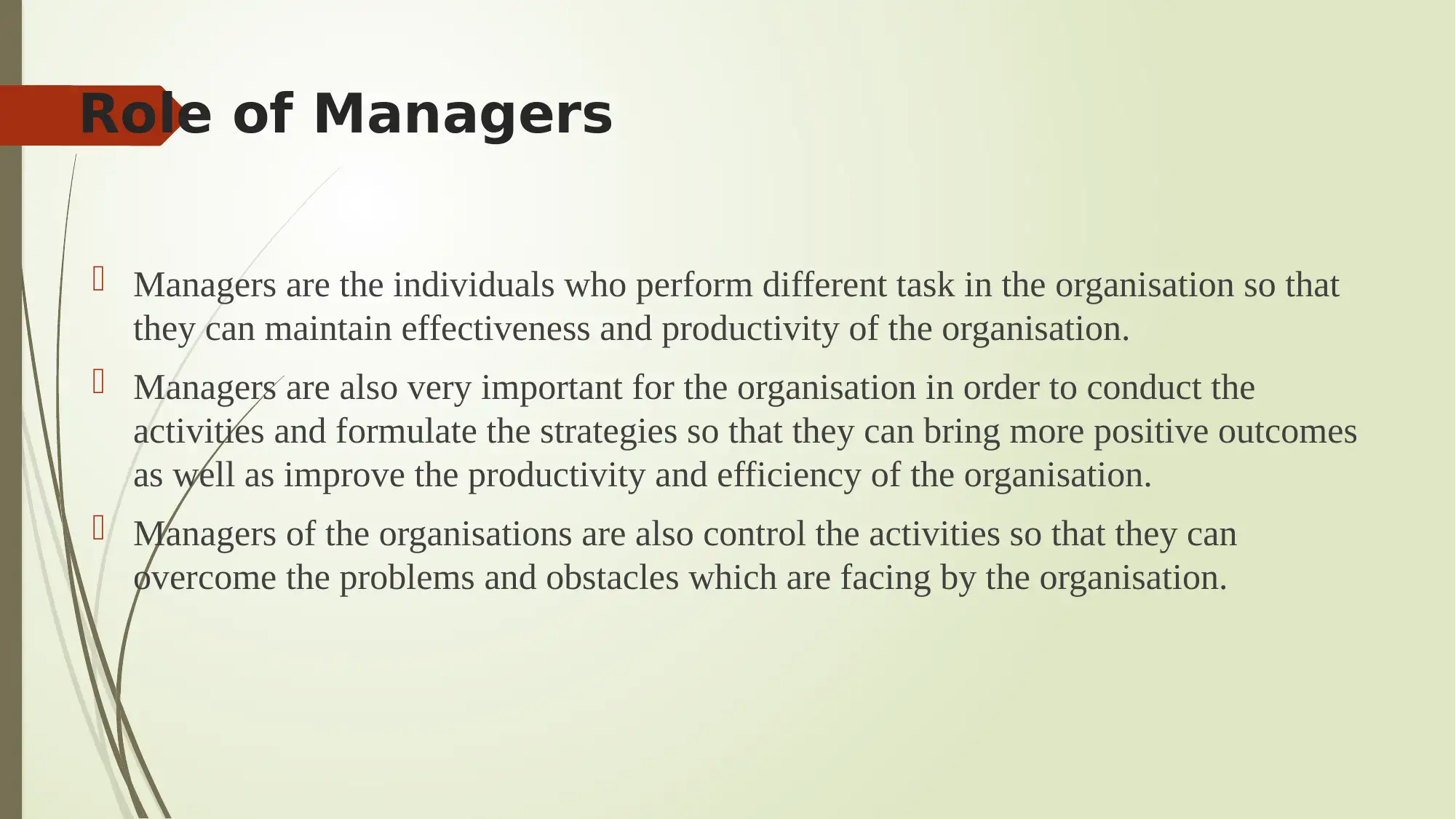
Role of Managers
Managers are the individuals who perform different task in the organisation so that
they can maintain effectiveness and productivity of the organisation.
Managers are also very important for the organisation in order to conduct the
activities and formulate the strategies so that they can bring more positive outcomes
as well as improve the productivity and efficiency of the organisation.
Managers of the organisations are also control the activities so that they can
overcome the problems and obstacles which are facing by the organisation.
Managers are the individuals who perform different task in the organisation so that
they can maintain effectiveness and productivity of the organisation.
Managers are also very important for the organisation in order to conduct the
activities and formulate the strategies so that they can bring more positive outcomes
as well as improve the productivity and efficiency of the organisation.
Managers of the organisations are also control the activities so that they can
overcome the problems and obstacles which are facing by the organisation.
Paraphrase This Document
Need a fresh take? Get an instant paraphrase of this document with our AI Paraphraser
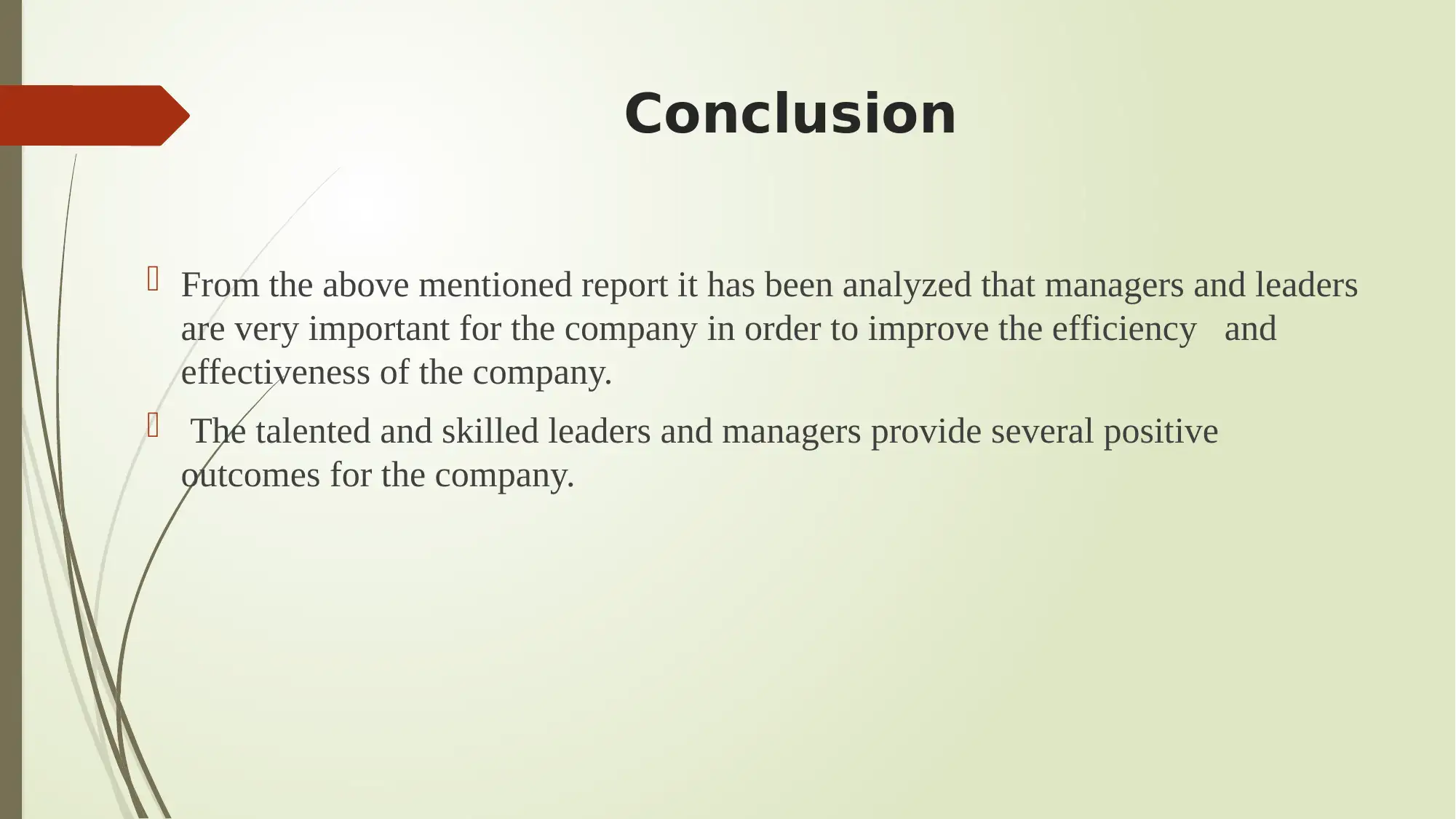
Conclusion
From the above mentioned report it has been analyzed that managers and leaders
are very important for the company in order to improve the efficiency and
effectiveness of the company.
The talented and skilled leaders and managers provide several positive
outcomes for the company.
From the above mentioned report it has been analyzed that managers and leaders
are very important for the company in order to improve the efficiency and
effectiveness of the company.
The talented and skilled leaders and managers provide several positive
outcomes for the company.
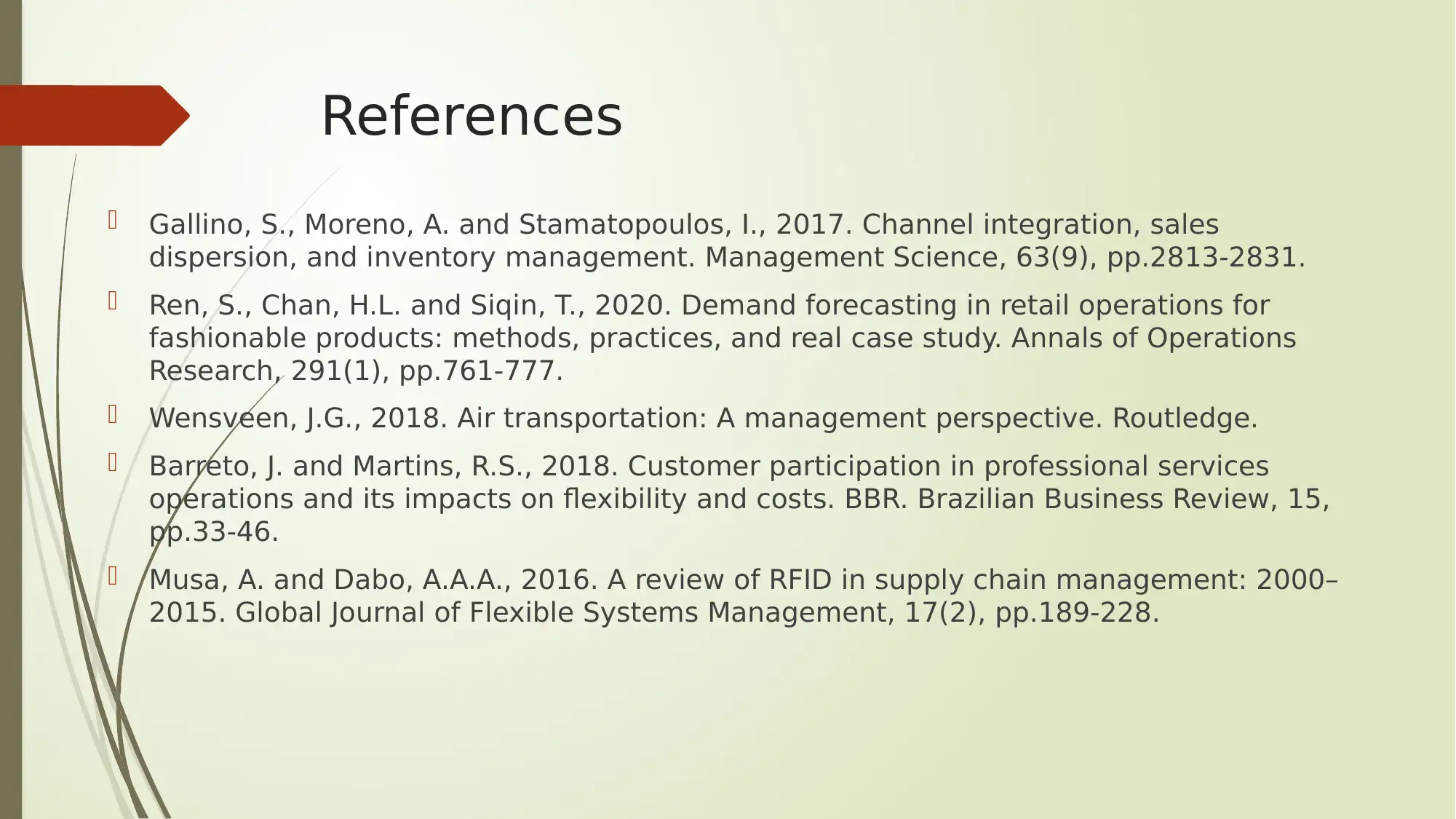
References
Gallino, S., Moreno, A. and Stamatopoulos, I., 2017. Channel integration, sales
dispersion, and inventory management. Management Science, 63(9), pp.2813-2831.
Ren, S., Chan, H.L. and Siqin, T., 2020. Demand forecasting in retail operations for
fashionable products: methods, practices, and real case study. Annals of Operations
Research, 291(1), pp.761-777.
Wensveen, J.G., 2018. Air transportation: A management perspective. Routledge.
Barreto, J. and Martins, R.S., 2018. Customer participation in professional services
operations and its impacts on flexibility and costs. BBR. Brazilian Business Review, 15,
pp.33-46.
Musa, A. and Dabo, A.A.A., 2016. A review of RFID in supply chain management: 2000–
2015. Global Journal of Flexible Systems Management, 17(2), pp.189-228.
Gallino, S., Moreno, A. and Stamatopoulos, I., 2017. Channel integration, sales
dispersion, and inventory management. Management Science, 63(9), pp.2813-2831.
Ren, S., Chan, H.L. and Siqin, T., 2020. Demand forecasting in retail operations for
fashionable products: methods, practices, and real case study. Annals of Operations
Research, 291(1), pp.761-777.
Wensveen, J.G., 2018. Air transportation: A management perspective. Routledge.
Barreto, J. and Martins, R.S., 2018. Customer participation in professional services
operations and its impacts on flexibility and costs. BBR. Brazilian Business Review, 15,
pp.33-46.
Musa, A. and Dabo, A.A.A., 2016. A review of RFID in supply chain management: 2000–
2015. Global Journal of Flexible Systems Management, 17(2), pp.189-228.
⊘ This is a preview!⊘
Do you want full access?
Subscribe today to unlock all pages.

Trusted by 1+ million students worldwide

Thank You
1 out of 10
Related Documents
Your All-in-One AI-Powered Toolkit for Academic Success.
+13062052269
info@desklib.com
Available 24*7 on WhatsApp / Email
![[object Object]](/_next/static/media/star-bottom.7253800d.svg)
Unlock your academic potential
Copyright © 2020–2026 A2Z Services. All Rights Reserved. Developed and managed by ZUCOL.





